- Home
- Annelie Wendeberg
River of Bones Page 2
River of Bones Read online
Page 2
I tapped a finger to my mouth. ‘You see what I say?’
He licked his lips.
A finger to my ear. ‘You don’t hear what I say?’
He dropped his gaze.
I turned to McCurley and leant my cheek against my hand so that the boy couldn’t read my lips. ‘Would you make a loud noise, please? I’d like to test a theory.’
He stood, lifted his chair and sat it down with force. At the harsh clonk, the boy’s gaze shot up to where chair legs had met floorboards. Nervously, he scanned us for clues. I smiled at him and motioned toward his left hand that was still splayed on the floor. ‘You listen with your fingers. You are very smart.’
A brief, unintended smile flitted across his features. Then he pressed his face back against his knees.
‘McCurley, the boy is deaf. I don’t know if anyone has taught him sign language, but I think if he knew it, he would have used it by now.’
‘There’s a school for deaf children only a few blocks from here,’ McCurley replied. ‘I will call for someone to try to talk to him. Sign to him. Perhaps, they can take him in for a few days until we find his family.’
‘Hum. What did the police surgeon recommend?’
McCurley hesitated. ‘Are you sure the boy can’t hear us?’
‘Yes. Very sure.’ I eyed the boy from the corner of my vision as he watched Klara draw a picture of what seemed to be Zach.
McCurley exhaled. ‘If I can’t find an alternative by the end of the day, the police surgeon will transfer the boy to an asylum for children.’
‘What kind of solution is that supposed to be? The boy is terrified. He trusts no one. He needs company, a warm bath, new clothes, food, and rest. Not a cell and a cold shower.’
‘The surgeon tried to have him bathed. There was…quite a ruckus.’
‘Well, so far we’re doing well.’ I turned back to the boy, and tapped my lips with my fingers. He knew the gesture well enough now. ‘You need a bath.’
His face darkened and he looked away.
Klara pushed her book toward him. When he didn’t react, she picked it up and shoved it against his shins. The boy scooted back.
‘Do you want him to have it?’ I asked her. She nodded. ‘As a present?’ She nodded more.
I wiggled my fingers in front of my face to catch the boy’s attention. ‘Klara wants you to have the book. It’s yours, if you want it.’
He stared at her for several long moments, then reached out and picked the book from her outstretched hands. With reverence, he opened it, caressed its pages, traced the illustrations of exotic birds, the colours of their plumage leaping from the paper. Klara inched closer, tapped his hand and rubbed a finger over his skin.
He froze, looked at the grimy back of his hand, turned it over to expose an even dirtier palm and wrist. A nervous glance bounced between me, Klara, and McCurley. The boy snapped the book shut and pushed it back to my daughter.
Klara snatched the boy’s fingers and pulled.
Confused and desperate, he squinted at me.
‘You can have a warm bath and new clothes. And then food.’
At that, his stomach yowled.
‘You can keep the book. It’s a present.’
And that was all it took.
McCurley walked ahead, then came Klara still holding the boy’s hand. I followed. Part of me feared the boy would snap and strike Klara. He was teetering on a dangerous edge.
‘There is warm water, isn’t there?’ I asked McCurley.
‘Of course. We have a circulation boiler installed for the common bathroom and the kitchens of the two boarding rooms upstairs.’
We entered the bathroom, and I began filling a tub with warm water from the tap, and found a bar of soap and a brush. The boy unbuttoned the remnants of his shirt. He threw glances from beneath his bangs to McCurley who sat on a stool by the door, seemingly immersed in a newspaper, and at Klara who sat by McCurley’s feet and stared up at him, puzzling over his silence.
‘Do you want the Inspector to leave?’ I asked.
He shrugged, pulled off his shoes, and shed a pair of trousers that merely reached down to his knees. He folded everything neatly on a pile atop his boots. Then he stepped into the tub, all bone and skin and grime. Stiffly, he folded himself into it, picked up the soap, and sniffed at it.
‘He needs clothes,’ I said to McCurley.
‘Boyle’s arranged some. I’ll go get them.’
When McCurley returned with a stack of clean second-hand clothes and a pair of boots, the boy had scrubbed off most of the grey layers that had covered his skin and hair. Nearly clean, his skin didn’t look much better. Signs of scabies, ringworm, and impetigo were visible from a distance. And I was sure his mop of wet brown hair was home to hundreds of lice.
Hoping to at least reduce the number of itch mites, I asked the boy to lather up once more, then turned to McCurley. ‘Burn everything he wore. He’s crawling with mites and has a variety of skin infections.’
McCurley sucked air through his teeth. ‘The medical examiner needs to look at them first.’
‘Then touch them only with a fire poker.’
‘You think he’s from the slums?’
‘I don’t know. Have you seen his knees and elbows?’
‘They are calloused.’
‘Yes. Is there a mine nearby?’
McCurley narrowed his eyes at the boy. ‘The Butte & Boston copper mine. But child labour has just been abolished. The factories are all inspected regularly. Anyone who employs children under fourteen is fined. Which doesn’t really mean a thing to some.’ Then he scratched his neck and added, ‘I need to question the boy. It can’t wait any longer. The trail is getting cold.’
2
I stepped off the omnibus and weaved my way up Hanover Street. It was unusually warm for September, which was extending the diarrhoeal season beyond what was normal. It usually started in June and ended in mid-August, killing thousands of babies among the destitute and hopeless. Mothers had no idea what to do with a wailing skeleton of a baby, and even when I told them what precautions they should take, they were often too resigned and discouraged to take them. Sometimes I wondered if this was hell. But I’ve never believed in the deities and their games.
The stink of old sweat and urine, decomposing goat and pig carcasses, and faeces stood thick in the air. I turned left, away from the Black Sea district, and the squalor took on a new dimension. The hopelessness, the entire lack of ambition of the mostly Irish population, was stunning. So much worse than what I’d experienced in London’s St Giles.
Again, I wondered if the boy from Mystic River had grown up here. It worried me that he was on constant alert and hadn’t replied to any of McCurley’s questions — all simple enough to be answered with A nod or a shake of the head. But the boy had only retreated farther and farther into his silent shell.
He was intelligent, that much was obvious. I saw nothing in him that reminded me of the many slum children who had been fed their first beer before they could even walk. There was a sharp mind behind those terrified hazel eyes, and I could only guess what had been done to him.
I hoped that McCurley had found a place for him, that the boy hadn’t spent the night in the Inspector’s office or in a holding cell.
I nearly stumbled over the stiff legs of a dead goat, distracted by a dozen children playing ball with a bundle of rags, tied together with string. Their goal was marked by two groups of drunks sitting slumped on the pavement, their backs propped against a wall. Other drunks lay flat on the ground, sleeping or unconscious. I scanned their faces in passing for signs of infectious disease — typhus, measles, smallpox. Finding none, I neared the wharves, where a heap of dozing children were guarded by three women, who nervously paced the perimeter. One tried to get a youngster to drink from a mug. White mourning cloths hung from nearly every window in the surrounding buildings.
I stopped at a distance of several paces, and announced that I was a physician and t
here to help. One of the mothers muffled a cry and made to embrace me, but I held up my hands, pulled a handkerchief up around my mouth and nose, made sure my hair was all tucked into a second handkerchief around my head, and then set to work. After a few brief questions, palpitating the children’s chests and abdomens, listening to their hacking coughs, examining their rashes, and taking their temperatures, it became clear that they all had typhus. Their grimy hair was crawling with lice, their scalps covered in scabs.
The youngest child was dying.
I looked up at one of the women. ‘How many have died already, and when?’
‘Started two weeks ago. The babes went first.’ She wiped her nose.
‘How many?’ I repeated.
‘Half a dozen.’
‘Did the Board of Health send anyone?’
Behind me, another woman snorted. ‘There was two young fellas sent. They walked all through that house.’ She waved at the building in front of us. ‘And into that’n over there. They wrote something into their little notebooks, and left. Didn’t even ask a question.’ She hiked the girdle of her skirts higher up and spat on the ground.
Sighing, I nodded. ‘Fetch a bucket of water, a few rags, and…’ I caught myself before I said beer. ‘And get cold tea. Wrap a wet cloth around each child’s calves and ankles to bring down the fever. They need to drink lots of liquids. And take them out of the sun, but make sure they get fresh air.’
A low-pitched, rough whistling noise sounded from the entrance of the alley. A watchman came running up, his police whistle bouncing around his neck. ‘You!’ he called out and pointed in our direction. The women slunk back into the house. The watchman’s gaze remained stuck on me. Panting, he slithered to a halt.
I pulled the handkerchief from my face. ‘Is there a problem?’
‘You are arrested!’
I gaped as he pulled a pair of manacles from his belt. ‘May I ask for what?’
‘Attempted killing.’
‘Wha—’ I was cut off by an elbow to my side. The manacles came down on my wrists. ‘Are you mad?’
‘Stop resisting!’ He jerked so hard on my arms that I feared he’d break my wrists. On instinct, I manoeuvred my body to lessen the pain but accidentally bumped my head against the man’s chin.
He retaliated with a fist to my face, and then I snapped. I was fully aware that I shouldn’t have called him ‘prick,’ and perhaps I should not have stomped my heel on is toes, but…
* * *
I woke in a cell. A stone floor had sucked all warmth from my prone body. My face was stuck to someone’s stinky boots. I lifted my head and looked up at the person whose feet I’d used as a pillow, and found a woman slumped on a bench, drool running from her half-open mouth.
Gingerly, I moved to a sitting position and was surprised that I was able to keep my food down. That idiot policeman had given me a headache that rivalled the pounding of a jackhammer.
‘Hello?’ I called through the barred door. ‘This is Dr Elizabeth Arlington. I believe I was arrested by mistake.’
Ha! How many people claim exactly that after waking up in a cell? Probably every single one of them. ‘Hello?’
No response.
I sat back down and put my throbbing head in my hands.
An hour or so later, someone walked up the corridor to the cells. I scrambled up and peeked through the bars. ‘Excuse me.’
The man who’d arrested me appeared. A sneer was plastered on his face.
‘Why was I arrested?’
‘Told you why. You nearly killed a man.’
‘And when was that, if I may ask?’
‘Couple of days ago. You threw a man down the stairs of his own home.’
‘I…what?’
‘A health inspector witnessed it and reported you to the police.’
It dawned on me. I had helped deliver a baby in Ward Six. The father was stone drunk, toppled about the room, and kept attacking me. I had to get rid of him. So I let him chase me out of the room. Then I bopped his chin. He staggered a few steps back and tumbled down the stairs. I’d had better things to do than tend to the goose egg on his head.
‘Your health inspector was mistaken. A drunkard attacked me while I was helping his wife deliver their baby.’
The watchman looked me up and down, and said, ‘You probably offered yourself to him for a beer, the way you look.’
‘Thanks to you, cockchafer,’ I pressed through my teeth.
He clonked his nightstick against the bars and showed me his teeth. ‘Want me to teach you what that mouth of yours is for, wench?’
For a brief moment, I did consider luring him into my cell and taking him down. Unfortunately, no one would believe my version of events. And simple protest wouldn’t get me anywhere with this man. So I opted for acting. I let my shoulders droop, turned away, and muttered, ‘Inspector McCurley will probably give you a medal.’
‘What did you say?’
I waved a hand at him. ‘Nothing.’
‘Did you say McCurley? Inspector McCurley? Is he looking for you?’
Sitting down next to the half-conscious woman who smelled like she had taken a swim in the sewers, I crossed my arms over my chest, and muttered, ‘I’m not saying anything about that knucklehead McCurley. I want a lawyer.’
He flashed a grin. ‘Well, well, well.’ He said and disappeared.
It was almost too easy.
It didn’t take long for McCurley to arrive. He glanced through the bars, and slowly turned back to the watchman. ‘Open the cell.’ His voice sounded amiable, but I heard the grit beneath the softness.
The watchman unlocked the door, and McCurley strode up to me. I remained seated, not sure what his plans were. His eyes lingered on mine for longer than necessary. He filled his lungs, turned around, and approached the watchman. ‘Just to make sure I understood you correctly: An inspector from the Board of Health reported that Dr Elizabeth Arlington had attempted to kill a man in Ward Six?’
The watchman nodded.
‘An officer was sent to her home at once, of course.’
‘We… I…’ was all the watchman managed.
‘And the Bureau of Criminal Investigation was notified of the attempted killing.’
‘Erm…’
‘Ah, I see. The case was given to you.’ McCurley spoke in a tone that implied the watchman was utterly brilliant, and thus, assigned the case.
‘It appears so.’ The man cleared his throat, blind to the trap he was stepping into.
‘A report was filed, of course.’
Here, the watchman gave a small shrug, and McCurley’s control snapped. He grabbed the man by the front of his uniform, lifted him clean off his feet and slammed him against the bars. Quite the feat. The watchman was not only heavier than McCurley, he was also two inches or so taller.
‘Hooper, I swear I’ll stuff your head through the bars if you don’t tell me what precisely the health inspector said, and who set you on this ridiculous errand!’
‘He…he…’
‘I want the name of the man!’ barked McCurley. His voice could have cut glass. I was glad I wasn’t on the receiving end of his wrath.
‘Jeffries,’ the watchman squeaked. ‘It was Jeffries! He said he heard someone say that she pushed a man down the stairs. He was unconscious for hours. He could have died!’
McCurley set Hooper back on his feet. ‘Where was that?’
‘At…at Clarks.’
‘Most everyone is unconscious at Clarks! They are all hopelessly drunk. They all topple down the stairs when going off to their beer dive. Don’t tell me you don’t know that! What problem does this Jeffries have with Dr Arlington?’
Despite the ruckus McCurley was making, the woman next to me continued snoring merrily.
‘Because she’s a troublemaker. Who knows what she gets for helping that hopeless scum!’ Hooper hissed, emphasising the word helping as if the word were a cockroach that needed crushing under his boot.
‘I might be able to explain that,’ I said, and both men looked at me as though I’d just materialised. ‘Jeffries and the other inspectors the Board of Health sends to Wards Six and Seven don’t report on infant deaths or infectious disease. They take fifty dollars each month for keeping quiet about the dire situation in the slums. I report every death and illness I observe. Without anyone asking me or paying me to do so. It makes the health inspectors and the Board look rather…bad.’
McCurley screwed his eyes shut, and snarled, ‘And how did you come by that fabulous black eye?’
‘She resisted arrest,’ Hooper volunteered. Talking wasn’t his forte. The man should be keeping his mouth shut. Permanently.
‘I resisted getting my wrists fractured. Watchman Cooper applied unnecessary force. I was already shackled when I got this.’ I pointed at my eye.
McCurley took in the watchman’s entirely unbruised face, and said softly, ‘May I borrow your manacles for a moment?’
The man found himself shackled and carted off in a heartbeat.
* * *
‘Would you like to freshen up a bit before a police carriage drives you home?’ McCurley asked on the way from the holding cells out into the street.
The sudden brightness hurt my eyes. Something dark was moving in my periphery. I blinked, and turned my head. The twitching dark blob moved with me. ‘No, I’d much rather retrieve my doctor’s bag. If it still exists, that is. I lost it when Hooper accosted me.’
‘Where?’
‘Fleet Street.’ I untied the two handkerchiefs and shook them out, then used them to slap at my clothes.
‘What are you doing?’
‘I was treating a group of children with typhus. They were infested with lice. I’m just making sure I get rid of most of the critters.’
‘I’ll accompany you,’ McCurley said, matter-of-factly.
‘Whatever for?’
‘To make up for all my stupid, arrogant, and corrupt colleagues.’ He was still seething. A few months back I’d told him my opinion of the police: stupid, arrogant, and corrupt. It seemed he agreed. McCurley was one of the few exceptions.

 Vow
Vow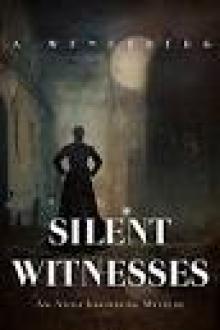 Silent Witnesses
Silent Witnesses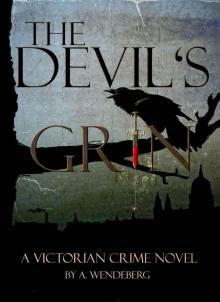 The Devil's Grin - A Crime Novel featuring Anna Kronberg and Sherlock Holmes (Kronberg Crimes)
The Devil's Grin - A Crime Novel featuring Anna Kronberg and Sherlock Holmes (Kronberg Crimes)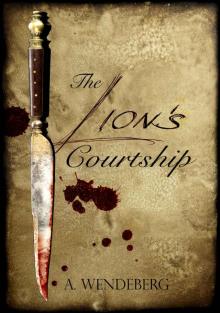 The Lion's Courtship: An Anna Kronberg Mystery
The Lion's Courtship: An Anna Kronberg Mystery 1/2986
1/2986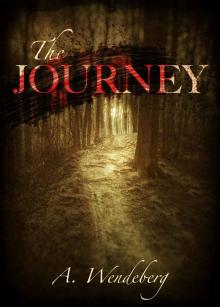 The Journey: Illustrated Edition (An Anna Kronberg Thriller)
The Journey: Illustrated Edition (An Anna Kronberg Thriller)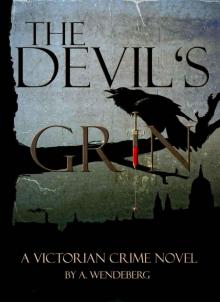 The Devil's Grin - a Crime Novel Featuring Anna Kronberg and Sherlock Holmes
The Devil's Grin - a Crime Novel Featuring Anna Kronberg and Sherlock Holmes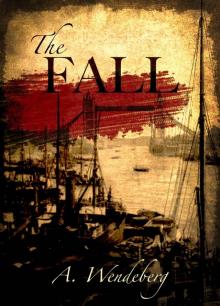 The Fall: Illustrated Edition (An Anna Kronberg Thriller Book 2)
The Fall: Illustrated Edition (An Anna Kronberg Thriller Book 2)